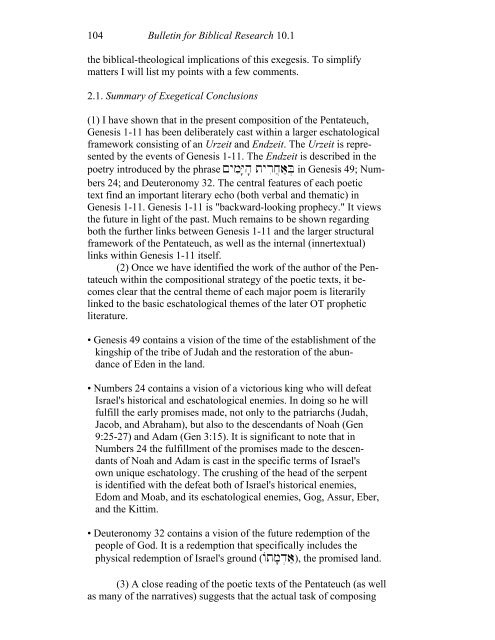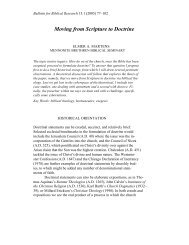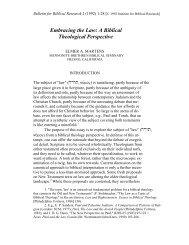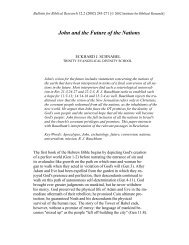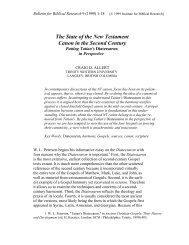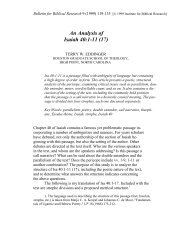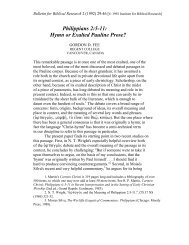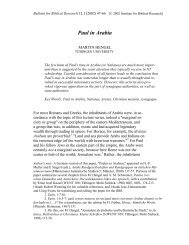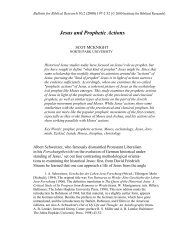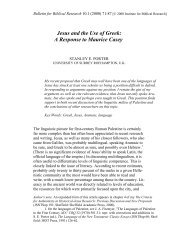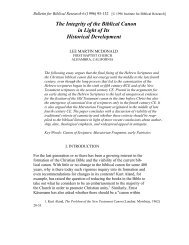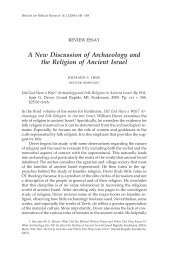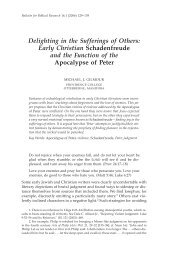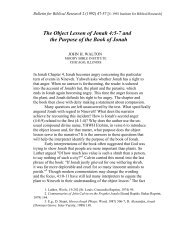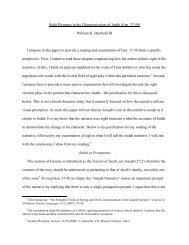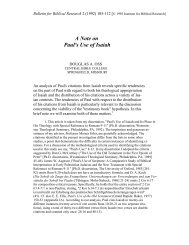Creation, Genesis 1-11, and the Canon - Institute for Biblical Research
Creation, Genesis 1-11, and the Canon - Institute for Biblical Research
Creation, Genesis 1-11, and the Canon - Institute for Biblical Research
You also want an ePaper? Increase the reach of your titles
YUMPU automatically turns print PDFs into web optimized ePapers that Google loves.
104 Bulletin <strong>for</strong> <strong>Biblical</strong> <strong>Research</strong> 10.1<br />
<strong>the</strong> biblical-<strong>the</strong>ological implications of this exegesis. To simplify<br />
matters I will list my points with a few comments.<br />
2.1. Summary of Exegetical Conclusions<br />
(1) I have shown that in <strong>the</strong> present composition of <strong>the</strong> Pentateuch,<br />
<strong>Genesis</strong> 1-<strong>11</strong> has been deliberately cast within a larger eschatological<br />
framework consisting of an Urzeit <strong>and</strong> Endzeit. The Urzeit is represented<br />
by <strong>the</strong> events of <strong>Genesis</strong> 1-<strong>11</strong>. The Endzeit is described in <strong>the</strong><br />
poetry introduced by <strong>the</strong> phrase Mymiy@fhf tyrixj)ab;@ in <strong>Genesis</strong> 49; Numbers<br />
24; <strong>and</strong> Deuteronomy 32. The central features of each poetic<br />
text find an important literary echo (both verbal <strong>and</strong> <strong>the</strong>matic) in<br />
<strong>Genesis</strong> 1-<strong>11</strong>. <strong>Genesis</strong> 1-<strong>11</strong> is "backward-looking prophecy." It views<br />
<strong>the</strong> future in light of <strong>the</strong> past. Much remains to be shown regarding<br />
both <strong>the</strong> fur<strong>the</strong>r links between <strong>Genesis</strong> 1-<strong>11</strong> <strong>and</strong> <strong>the</strong> larger structural<br />
framework of <strong>the</strong> Pentateuch, as well as <strong>the</strong> internal (innertextual)<br />
links within <strong>Genesis</strong> 1-<strong>11</strong> itself.<br />
(2) Once we have identified <strong>the</strong> work of <strong>the</strong> author of <strong>the</strong> Pentateuch<br />
within <strong>the</strong> compositional strategy of <strong>the</strong> poetic texts, it becomes<br />
clear that <strong>the</strong> central <strong>the</strong>me of each major poem is literarily<br />
linked to <strong>the</strong> basic eschatological <strong>the</strong>mes of <strong>the</strong> later OT prophetic<br />
literature.<br />
• <strong>Genesis</strong> 49 contains a vision of <strong>the</strong> time of <strong>the</strong> establishment of <strong>the</strong><br />
kingship of <strong>the</strong> tribe of Judah <strong>and</strong> <strong>the</strong> restoration of <strong>the</strong> abundance<br />
of Eden in <strong>the</strong> l<strong>and</strong>.<br />
• Numbers 24 contains a vision of a victorious king who will defeat<br />
Israel's historical <strong>and</strong> eschatological enemies. In doing so he will<br />
fulfill <strong>the</strong> early promises made, not only to <strong>the</strong> patriarchs (Judah,<br />
Jacob, <strong>and</strong> Abraham), but also to <strong>the</strong> descendants of Noah (Gen<br />
9:25-27) <strong>and</strong> Adam (Gen 3:15). It is significant to note that in<br />
Numbers 24 <strong>the</strong> fulfillment of <strong>the</strong> promises made to <strong>the</strong> descendants<br />
of Noah <strong>and</strong> Adam is cast in <strong>the</strong> specific terms of Israel's<br />
own unique eschatology. The crushing of <strong>the</strong> head of <strong>the</strong> serpent<br />
is identified with <strong>the</strong> defeat both of Israel's historical enemies,<br />
Edom <strong>and</strong> Moab, <strong>and</strong> its eschatological enemies, Gog, Assur, Eber,<br />
<strong>and</strong> <strong>the</strong> Kittim.<br />
• Deuteronomy 32 contains a vision of <strong>the</strong> future redemption of <strong>the</strong><br />
people of God. It is a redemption that specifically includes <strong>the</strong><br />
physical redemption of Israel's ground (wOtmfd;)a), <strong>the</strong> promised l<strong>and</strong>.<br />
(3) A close reading of <strong>the</strong> poetic texts of <strong>the</strong> Pentateuch (as well<br />
as many of <strong>the</strong> narratives) suggests that <strong>the</strong> actual task of composing


